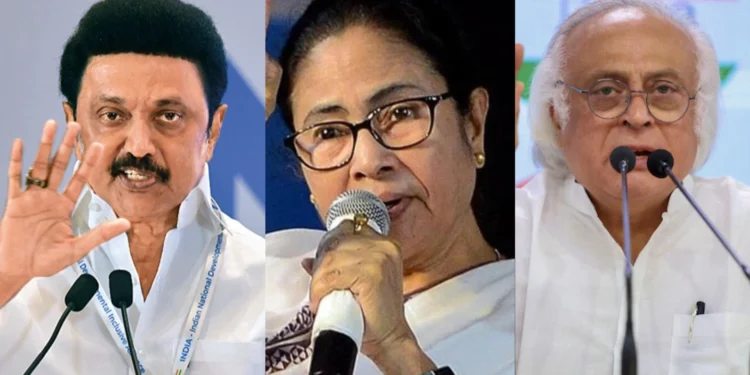Lagatar24 Desk
New Delhi: The Union Cabinet’s approval of the ‘One Nation, One Election’ bill has sparked sharp criticism from the Opposition, with several INDIA bloc leaders condemning the move as an attempt to undermine democracy and federalism. The bill, which proposes simultaneous elections for the Lok Sabha, state assemblies, and local bodies, is expected to be tabled in the ongoing winter session of Parliament.
Voices from the Opposition
Tamil Nadu Chief Minister MK Stalin described the bill as a “draconian measure” that could erase regional voices and disrupt governance. “This attack on Indian democracy must be resisted with all our strength,” he asserted.
AAP National Convenor Arvind Kejriwal called the BJP’s priorities “misplaced,” stating, “The country needs one nation, one education, and one nation, one healthcare system—not one nation, one election.”
West Bengal Chief Minister Mamata Banerjee condemned the proposal as “unconstitutional” and an “authoritarian imposition,” emphasizing that it undermines India’s federal structure. “Bengal will never bow to Delhi’s dictatorial whims,” she declared, vowing to oppose the legislation “tooth and nail” in Parliament.
Punjab Chief Minister Bhagwant Singh Mann criticized the focus on election reforms over essential issues like education and healthcare. “Unified education and healthcare would benefit the public, but this election proposal seems aimed at advancing the ruling party’s political agenda,” he argued, describing the move as arbitrary and harmful to regional parties.
Details of the Proposal
The Cabinet’s decision comes weeks after the Centre endorsed the recommendations of a high-level committee chaired by former President Ram Nath Kovind. The committee proposed phased simultaneous elections, aiming to address frequent electoral disruptions.
To foster consensus, the government plans to refer the bill to a Joint Parliamentary Committee (JPC) and consult state assembly Speakers, intellectuals, and civil society members. Public input will also be sought.
Concerns Raised by the Opposition
Opposition leaders questioned the logistics and constitutionality of simultaneous elections, arguing that such a move could dilute regional representation and erode the country’s democratic fabric.
Stalin and Banerjee highlighted the risks to federalism, while Kejriwal and Mann called for prioritizing critical public issues like education and healthcare over electoral reforms.







